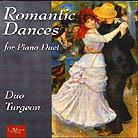December 1999
Much music was transcribed for piano duet -- it was probably the only way most people before the gramophone would ever have heard, say, a Beethoven symphony -- and much was composed especially for it. Beethoven's last work for keyboard, for example, was his own arrangement for piano duet of the "Grosse Fugue," the original finale of his string quartet Op.130. He thought highly enough of it to give it its own opus number (134), although it is apparently virtually impossible to play on a single keyboard. Franz Schubert was another who wrote for piano duet. In fact, he wrote a tremendous amount of music in the form (around eight hours); the two short pieces included on this disc are merely the tip of that particular iceberg (all of which can be heard in the four volumes of the Duo Tal-Groethuysen's excellent series on Sony). And finally, the two great late 19th-century sets of Dances -- Brahms' "Hungarian Dances" (we know a good deal more about what is and isn't Hungarian than Brahms did) and Dvorak's "Slavonic Dances" -- were both composed for piano duet and only orchestrated, largely by others in Brahms' case, later. It is hardly surprising, then, that this disc includes four of the Brahms set and one of the Dvorak. Far more surprising is the delightful set of waltzes by Max Reger, which opens the disc. Reger's reputation is of an overly serious composer of dry, academic, downright dull music. Although some of us have long known this to be a libel, the sheer frothy charm of these pieces took me quite by surprise; they are gorgeous (and there are evidently plenty more where they came from). Moritz Moszkowski was one of the great composer-pianists of the turn of the century; his playing is still remembered by pianophiles, but his own compositions are out of fashion. This is a pity, as the four Polish folk-song settings here demonstrate; it is nice to hear genuine examples of the dances -- mazurkas, polonaises -- that inspired Chopin's masterpieces. The disc closes with four of Grieg's "Norwegian Dances," again charming, delightful music, the second of which was used by the BBC, I think, as theme music for a children's TV program in the 1950s. I don't recall the program at all, but the music captures perfectly a tiny slice of my childhood to the extent of sending chills down my spine every time I hear it. Much of this music is admittedly fairly slight, but the selection is varied enough that the disc never outstays its welcome. It would be a mistake to play this music too seriously and an equal one not to treat it with sufficient respect. The Canadian husband-and-wife team (I think this is the case; the liner note is a little vague) of Edward Turgeon and Ann Louise-Turgeon seem to me to have the balance just right. They play every piece beautifully, with plenty of life in the quicker music and with evident affection throughout; and they are very well recorded. And although none of the music here is French, the faux-Renoir painting on the cover seems entirely apt. Quite lovely. GO BACK TO: |
 Duo Turgeon - Romantic Dances for Piano Duet
Duo Turgeon - Romantic Dances for Piano Duet![[Reviewed on CD]](../format/regcd.gif) In the
19th-century parlor, the "home-entertainment center" was the piano, around which
the family would gather of an evening. They "made their own entertainment in those
days," as they used to say and this went on until well into the 20th century. Playing
piano duets (four hands on one keyboard), apart from being musically rewarding, also had
the additional side-effect of allowing people of opposite sexes to sit in what would
otherwise have been considered unseemly proximity.
In the
19th-century parlor, the "home-entertainment center" was the piano, around which
the family would gather of an evening. They "made their own entertainment in those
days," as they used to say and this went on until well into the 20th century. Playing
piano duets (four hands on one keyboard), apart from being musically rewarding, also had
the additional side-effect of allowing people of opposite sexes to sit in what would
otherwise have been considered unseemly proximity.